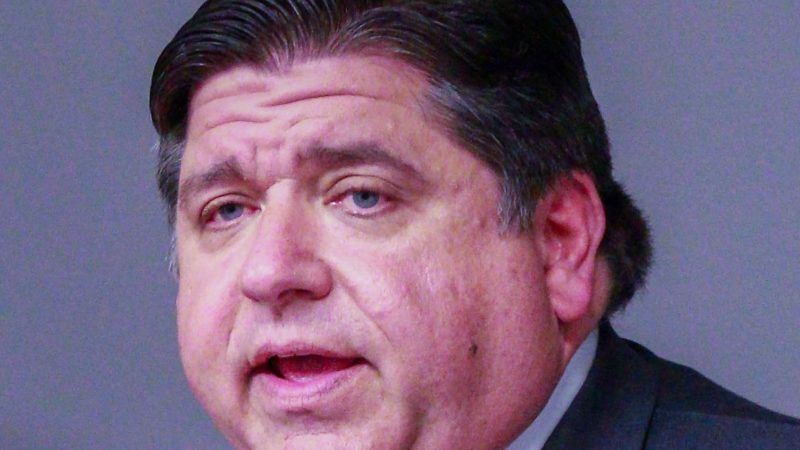Lockdown Lawsuits Ask How Long a Public Health Emergency Can Last
An Illinois resident obtained a TRO by citing a 30-day limit, while a New Hampshire hair salon owner says the goal of her state's lockdown has been achieved.

The longer COVID-19 lockdowns last, Texas Supreme Court Justice James Blacklock suggested last week, the more legally vulnerable they may be. "As more becomes known about the threat and about the less restrictive, more targeted ways to respond to it," Blacklock said, "continued burdens on constitutional liberties may not survive judicial scrutiny."
Lockdown resisters are testing that hypothesis in state courts, arguing that the public health emergencies governors cited when they ordered businesses to close and told people to stay at home no longer exist. An Illinois lawsuit made that case based on a statute that limits the length of a governor's emergency declarations—an argument that last month persuaded a judge to issue a temporary restraining order. A New Hampshire lawsuit filed this week claims new circumstances have eliminated the statutory rationale for that state's lockdown.
Illinois resident Darren Bailey sued Gov. J.B. Pritzker on April 23, noting that his March 20 lockdown order was based on a March 9 COVID-19 disaster declaration. Under the Illinois Emergency Management Agency Act, which says such proclamations can last no longer than 30 days, the public health emergency declared by Pritzker would have expired on April 8. But on April 1, Pritzker declared a "continuing public health emergency" and extended his lockdown order until April 30. Three weeks later, Pritzker said he planned to further extend the lockdown.
Contrary to the law, Bailey said, Pritzker is "utilizing the emergency powers for more than 30 days from the declaration of disaster." Instead of respecting that limit, he argued, "Pritzker is issuing redundant proclamations" aimed at "reenergizing the emergency provisions of The Act for the sole purpose of rendering the statutory 30-day limitation placed on his emergency powers meaningless."
In an April 27 ruling, Clay County Circuit Judge Michael McHaney sided with Bailey, issuing a temporary restraining order (TRO) that enjoined Pritzker from enforcing his stay-at-home order against Bailey. "Plaintiff has shown he has a clearly ascertainable right in need of immediate protection, namely his liberty interest to be free from Pritzker's executive order of quarantine in his own home," McHaney wrote. "Plaintiff has a reasonable likelihood of succeeding on the merits."
Pritzker asked the Illinois Appellate Court to vacate McHaney's TRO. He also asked the Illinois Supreme Court to intervene, which it declined to do yesterday. But Bailey already had asked the appeals court to vacate the TRO, saying he planned to file an amended lawsuit.
Hair salon owner Mary Rivard is trying a similar approach in New Hampshire, where she sued Gov. Chris Sununu this week. While businesses like Rivard's were allowed to reopen yesterday, she objects to the restrictions imposed on them, which she calls "nonsensical, illogical, and inefficient." Among other things, the new rules ban blow drying, require that customers as well as stylists wear face masks, dictate a 1-to-1 ratio of employees to customers, and mandate that customers be screened for COVID-19 symptoms.
Rivard argues that Sununu has achieved the official goal of his lockdown, which aimed to "slow the spread of COVID-19" enough to avoid a hospital crisis. "'Emergency' measures that appeared to be Constitutionally appropriate in March are less appropriate now," her complaint says, "given the wealth of information available that demonstrates New Hampshire's healthcare system never came close to reaching capacity, and the Coronavirus is not as deadly as previously thought."
While that appears to be true, the complaint underestimates the lethality of COVID-19 by describing it as "nothing more than a more serious strain of the flu." The main thrust of Rivard's argument, however, is that stopping the spread of the virus was never a realistic goal, given the lack of a vaccine and the absence of wide immunity, while the more modest goal of preventing a hospital crisis has been reached.
"There is no 'state of emergency' in New Hampshire," the complaint says. "The original need for shutting down the New Hampshire economy no longer exists, and there exists no basis for Governor Sununu's recent orders extending that 'state of emergency' and the resulting shutdown of 'non-essential' businesses….The continuing shutdown is preventing the New Hampshire population from achieving 'herd immunity,' which would ultimately eradicate the virus much more quickly than 'slowing the spread' by forcing the shutdown of businesses and ordering people to stay home. It is also destroying the state's economy."
In Michigan, meanwhile, a 77-year-old barber who defied Gov. Gretchen Whitmer's business closure order will get a chance to challenge the state's claim that he poses "an imminent danger to public health." Shiawassee County Circuit Judge Matthew Stewart yesterday refused to approve a TRO against Karl Manke, who this month reopened his barber shop in Owosso, without a hearing.
Owosso is a small city about 30 miles northeast of Lansing. It is part of Shiawassee County, which has a population of 68,000 and so far has reported 214 COVID-19 cases, including 18 deaths. Manke said he was taking precautions such as wearing a mask, maintaining social distancing when he is not cutting hair, and sanitizing his tools with ultraviolet light.
"The Court wanted to provide Mr. Manke with an opportunity for a hearing on the request for an injunction, despite the clear public health dangers that continued operation of his business creates," a spokesman for Michigan Attorney General Dana Nessel complained. Manke still faces two misdemeanor charges, each punishable by a $500 fine or up to 90 days in jail, for violating Whitmer's order.


Show Comments (85)